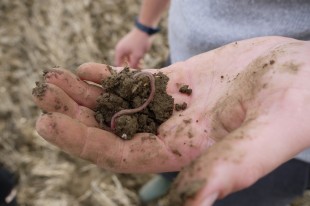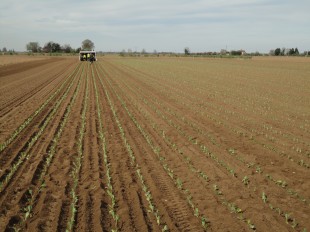The agri-food sector is a core component of the agri-tech industry, contributing £97 billion to the UK economy with household expenditure on food and drink exceeding £100 billion annually. The supply chains in this sector are complex and interconnected with high exposure to the global challenges of food security, climate change, population growth and resource scarcity. This is especially pertinent for field-scale fresh produce, where the demands of high-value horticultural systems are often at odds with the natural systems which underpin them. The fresh produce category holds huge potential for growth where shifting diets and working to achieve ‘5-a-day’ will drive sales whilst benefiting society as a whole in helping to support a robust response to chronic disease and obesity. Ensuring that this growth is sustainable is central to the aims of the Agri-Tech Strategy, the viability of the sector and the expectations of the consumer.
Produce World Group is one of the UK’s largest fresh produce businesses, supplying vegetable products to the UK retail market and prepared sector. I joined the company over four years ago as a Knowledge Transfer Partnership (KTP) associate, working in partnership with Cranfield University to drive our understanding of the soil systems which underpin our supply chains. This KTP project (rated as ‘outstanding’) focused on collating and mining the ‘big data’ that exists within the supply chain and farm systems, such as soil analyses, crop rotations and fertiliser records, and integrating these datasets into an aggregated data holding. The aggregation of this kind of data could ultimately be used by us and our producers to understand and manage the drivers behind farm system performance.
Through this project we developed the Soil-for-life system, which is an information system capable of collating the data within these supply chains to provide decision support from seed to shelf. The system is underpinned by the emergent, innovative and interdisciplinary field of ‘agri-informatics’, whereby statistics and database management techniques are used to exploit knowledge held in multiple ’big data’ sets across our grower-base and supply chain. At the conclusion of the KTP project in June 2013 it was agreed that further development of the system was required to take the system from proof-of-concept to commercial application.
In May 2014 our successful partnership with Cranfield University was awarded an Agri-Tech Catalyst Industrial Research Award to facilitate this progression and in September 2014 we began work on the 3-year project. Soil-for-life Beta, will extend the success of the KTP project across key growers within the Produce World Group supply chain, working closely with these end users to develop an informatics toolkit which can be used to interrogate the wider data holdings and drive the promotion of soil health and sustainable intensification.
The project aims to:
- drive improvements in crop production and crop utilisation, resulting in direct increases in crop packout (reduced wastage) and operational efficiencies;
- identify more effective, crop-specific and rotation-based soil and agronomic best practices;
- drive improvements in current crop performance models;
- facilitate the design of soil/crop management adaptations to mitigate the impact of climate variability;
- make progress towards the optimization of crop specific/cross-rotational fertiliser inputs; and
- identify innovative rotation-based pest and disease management best practices.
As Produce World Group looks to grow over the next 5 years, this system will ensure that we are sourcing from a sustainable and resilient land bank. Soil-for-life provides us with the capabilities to identify at a primary production scale the practices which are working to improve the soils that we are so reliant upon to ensure that they can continue to support the production of horticultural crops in synergy with environmental functions. This project is a demonstration of agricultural informatics in practice and at its core it recognises that the key to big data is not the data, but the information and knowledge that can be derived from it to drive truly sustainable growth. This project will allow Soil-for-life to be rolled out as a fully functional product to the wider Produce World grower base, encompassing a comprehensive range of rotations. It is expected that this will act as the catalyst for the wider adoption of Soil-for-life by UK growers and help drive forwards sustainable intensification.
Guy Thallon, Group Sustainability and Research Manager at Produce World Group



Recent Comments